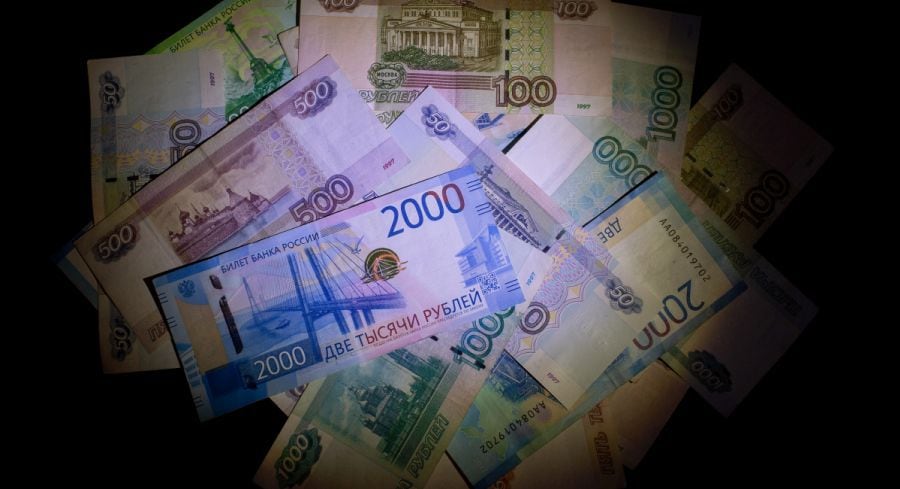
Russia’s central bank more than doubled its official interest rate on Monday and introduced some capital controls, at a time when the country faces growing economic isolation, but its governor said sanctions had prevented him from selling foreign currency. to prop up the ruble.
The central bank announced on Monday that it will strongly increase the reference interest rate, which will go from 9.5% to 20%, in an attempt to face the severe economic sanctions that different Western countries have agreed to, in response to the Russian invasion of Ukraine. ordered by President Vladimir Putin.
The admission that the restrictions have effectively tied the Bank of Russia’s hands underscores the ferocity of the reaction to Moscow’s invasion of Ukraine and the success of Western allies in restricting its ability to deploy some $640 billion of reserves. currency and gold.
“The central bank today raised its key interest rate to 20% as new sanctions have caused a significant deviation in the ruble exchange rate and limited the central bank’s options to use its gold and foreign exchange reserves.s,” Governor Elvira Nabiullina said at a press conference.
“We had to raise rates (to) compensate citizens for increased inflation risks”, he added.
Western sanctions had sent the ruble plummeting nearly 30% to record lows. The currency recovered some ground after the central bank raised its main rate to 20%, the highest level this century, from 9.5%.
The Bank of Russia sold $1 billion in foreign exchange markets on Thursday, Nabiullina said, but did not intervene on Monday.
“Given the restrictions on the use of gold and currency reserves in dollars and euros, we do not make interventions todayNabiullina said.
The absence of the market suggests that the ruble was supported by other unidentified players.
On Monday, the central bank and finance ministry said they would order exporting companies, which include some of the world’s biggest energy producers from Gazprom to Rosneft, to sell 80% of their foreign exchange earnings in the market, as the central bank’s own ability to intervene was limited.
The United States and Great Britain have prohibited their citizens or entities from conducting transactions with the central bank, the Russian National Wealth Fund or the Russian Ministry of Finance.
Switzerland said it would adopt European Union sanctions against Russians implicated in the Ukraine invasion and freeze their assets, in a major departure from the country’s tradition of neutrality.
cash demand
Major Russian banks have also been excluded from the SWIFT messaging network, which facilitates trillions of dollars worth of financial transactions around the world, making it difficult for lenders and businesses to make and receive payments.
Nabiullina said Russia had an internal replacement for SWIFT that foreign counterparties could connect to, but gave no details.
The banking sector is facinga structural liquidity deficit” due to the high demand for cash, Nabiullina said.
“The central bank will be flexible to use any necessary tools (…) the banks have enough coverage to obtain financing from the central bankNabiullina said.
Russians had queued at ATMs on Sunday, worried that the sanctions could trigger a cash shortage and disrupt payments.
All banks will meet their obligations and the funds in their accounts are safe, Nabiullina said, although the central bank was recommending that banks restructure some clients’ loans.
global implications
Nomura analysts noted in a note to clients that the West’s new retaliatory measures against Russia could have broader global implications.
“These Western sanctions will likely affect Russia’s trade flows (about 80% of foreign exchange transactions handled by Russian financial institutions are in dollars), which will also affect the growth prospects of Russia’s main trading partners, including Europe, and will lead to further inflationary pressure and the risk of stagflation”.
An order for Russian brokers to reject sales of Russian securities by foreign clients could complicate plans by Norwegian and Australian sovereign wealth funds to reduce their exposure to Russian-listed companies.
It was also unclear how energy company BP, Russia’s biggest foreign investor, was going to follow through on its decision to ditch its stake in state oil company Rosneft at a cost of up to $25 billion.
Global bank HSBC and the world’s largest aircraft leasing company, AerCap, are among other Western companies seeking to exit Russia over their actions in Ukraine, which Moscow has called a “special operation”.
Sharp drop in the ruble
Meanwhile, the ruble collapsed in the Forex market by almost 30 percent against the dollar and the euro after the announcement by some banks of the international interbank communications system SWIFT and the paralysis by the European Union (EU) of transactions. with the Central Bank of Russia (BCR). Shortly after 0900 local time (0600 GMT), the ruble lost 27.02% against the euro.
On Friday, the Russian currency was trading at 93.5 rubles per euro. This Monday it reached the level of 119.8 rubles per euro. The Russian Central Bank also released 733 billion rubles from accumulated capital reserves, in an attempt to ensure financial stability and inject liquidity into the market. The figure is equivalent to 6,200 million euros.
Before Western sanctions and the invasion of Ukraine, inflation was already skyrocketing in Russia, forcing the central bank to raise its benchmark rate several times.
Source: Gestion
Ricardo is a renowned author and journalist, known for his exceptional writing on top-news stories. He currently works as a writer at the 247 News Agency, where he is known for his ability to deliver breaking news and insightful analysis on the most pressing issues of the day.











